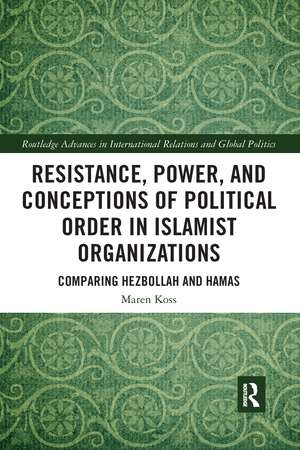Resistance, Power and Conceptions of Political Order in Islamist Organizations: Comparing Hezbollah and Hamas: Routledge Advances in International Relations and Global Politics
Autor Maren Kossen Limba Engleză Paperback – 30 iun 2021
Based on primary Arabic data the book illustrates that the core norm of resistance, deeply intertwined with both organizations' interactions towards power preservation and the specific political context they are engaged in, characterizes Hezbollah's and Hamas' respective conceptions of political order and explains the differences between them. In contrast to common perceptions presented in research, politics, and the media, the book shows that in the case of both Hezbollah and Hamas the religious orientation, i.e. Shiite and Sunni Islamist political thought, plays a secondary role only when it comes to explaining Islamist organizations' political orientation.
Bringing new insights from cases that lie beyond the Western liberal world order into Critical Constructivist norm research and resistance studies, the book establishes a theoretical framework that enables scholars to comprehensively analyze Islamist organizations' political orientation in different cases without being caught in limited analytical categories. It will be of interest to students and scholars of International Relations Theory, Middle East Studies, and Global Governance.
| Toate formatele și edițiile | Preț | Express |
|---|---|---|
| Paperback (1) | 317.91 lei 3-5 săpt. | +18.67 lei 7-13 zile |
| Taylor & Francis – 30 iun 2021 | 317.91 lei 3-5 săpt. | +18.67 lei 7-13 zile |
| Hardback (1) | 819.90 lei 6-8 săpt. | |
| Taylor & Francis – 11 ian 2018 | 819.90 lei 6-8 săpt. |
Din seria Routledge Advances in International Relations and Global Politics
-
 Preț: 383.46 lei
Preț: 383.46 lei -
 Preț: 310.55 lei
Preț: 310.55 lei -
 Preț: 188.83 lei
Preț: 188.83 lei -
 Preț: 152.85 lei
Preț: 152.85 lei -
 Preț: 311.59 lei
Preț: 311.59 lei - 9%
 Preț: 1003.10 lei
Preț: 1003.10 lei - 8%
 Preț: 390.06 lei
Preț: 390.06 lei -
 Preț: 377.82 lei
Preț: 377.82 lei -
 Preț: 303.46 lei
Preț: 303.46 lei - 18%
 Preț: 1170.74 lei
Preț: 1170.74 lei - 18%
 Preț: 1051.55 lei
Preț: 1051.55 lei - 18%
 Preț: 1220.46 lei
Preț: 1220.46 lei - 28%
 Preț: 850.99 lei
Preț: 850.99 lei - 18%
 Preț: 1056.32 lei
Preț: 1056.32 lei - 18%
 Preț: 1053.57 lei
Preț: 1053.57 lei - 18%
 Preț: 1057.89 lei
Preț: 1057.89 lei - 18%
 Preț: 1056.28 lei
Preț: 1056.28 lei - 18%
 Preț: 1066.09 lei
Preț: 1066.09 lei - 18%
 Preț: 1062.26 lei
Preț: 1062.26 lei - 18%
 Preț: 1056.32 lei
Preț: 1056.32 lei - 15%
 Preț: 449.41 lei
Preț: 449.41 lei - 22%
 Preț: 300.01 lei
Preț: 300.01 lei - 18%
 Preț: 1167.36 lei
Preț: 1167.36 lei - 28%
 Preț: 820.56 lei
Preț: 820.56 lei - 18%
 Preț: 1060.87 lei
Preț: 1060.87 lei - 18%
 Preț: 1270.98 lei
Preț: 1270.98 lei - 18%
 Preț: 1167.71 lei
Preț: 1167.71 lei - 18%
 Preț: 1112.21 lei
Preț: 1112.21 lei - 18%
 Preț: 997.11 lei
Preț: 997.11 lei -
 Preț: 427.12 lei
Preț: 427.12 lei - 18%
 Preț: 1057.40 lei
Preț: 1057.40 lei -
 Preț: 355.58 lei
Preț: 355.58 lei - 18%
 Preț: 1057.75 lei
Preț: 1057.75 lei - 18%
 Preț: 1115.33 lei
Preț: 1115.33 lei - 18%
 Preț: 1052.89 lei
Preț: 1052.89 lei - 26%
 Preț: 850.37 lei
Preț: 850.37 lei -
 Preț: 389.38 lei
Preț: 389.38 lei - 18%
 Preț: 1120.55 lei
Preț: 1120.55 lei - 18%
 Preț: 1059.93 lei
Preț: 1059.93 lei - 18%
 Preț: 1059.84 lei
Preț: 1059.84 lei - 18%
 Preț: 951.96 lei
Preț: 951.96 lei - 18%
 Preț: 1058.79 lei
Preț: 1058.79 lei - 18%
 Preț: 1061.81 lei
Preț: 1061.81 lei - 48%
 Preț: 572.55 lei
Preț: 572.55 lei - 18%
 Preț: 1059.84 lei
Preț: 1059.84 lei - 18%
 Preț: 1000.27 lei
Preț: 1000.27 lei - 18%
 Preț: 1056.28 lei
Preț: 1056.28 lei - 18%
 Preț: 1057.75 lei
Preț: 1057.75 lei
Preț: 317.91 lei
Nou
Puncte Express: 477
Preț estimativ în valută:
60.83€ • 63.68$ • 50.33£
60.83€ • 63.68$ • 50.33£
Carte disponibilă
Livrare economică 15-29 martie
Livrare express 01-07 martie pentru 28.66 lei
Preluare comenzi: 021 569.72.76
Specificații
ISBN-13: 9781032095844
ISBN-10: 1032095849
Pagini: 238
Ilustrații: 3 Illustrations, black and white
Dimensiuni: 156 x 234 x 13 mm
Greutate: 0.35 kg
Ediția:1
Editura: Taylor & Francis
Colecția Routledge
Seria Routledge Advances in International Relations and Global Politics
Locul publicării:Oxford, United Kingdom
ISBN-10: 1032095849
Pagini: 238
Ilustrații: 3 Illustrations, black and white
Dimensiuni: 156 x 234 x 13 mm
Greutate: 0.35 kg
Ediția:1
Editura: Taylor & Francis
Colecția Routledge
Seria Routledge Advances in International Relations and Global Politics
Locul publicării:Oxford, United Kingdom
Public țintă
Postgraduate and UndergraduateCuprins
1. Introduction: Islamist Organizations’ Conceptions of Political Order, Resistance, and Power 2. Bridging the Gap: Connecting Islamism Research and Critical Constructivism 3. The Lebanese Hezbollah: Politics Serve Resistance 4. The Palestinian Hamas: Resistance, Governance, and Ambitions for Maintaining Power 5. Hezbollah and Hamas: The Interplay of Resistance, Power, and Political Order 6. Outlook: Ruling Islamist Organizations and the Connection of Norms, Power, and Conceptions of Political Order 7. Conclusion
Notă biografică
Maren Koss has completed a PhD at the GIGA German Institute of Global and Area Studies and the University of Hamburg. She is an International Relations Theory researcher and an area specialist on the Middle East and North Africa, especially on the following topics: Political Islam, Hezbollah, Hamas, Muslim Brotherhood, Lebanon, Palestinian Territories, and Syria.
Descriere
This book provides a comprehensive analysis of Islamist organizations' conceptions of political order based on a comparative case study of the Shiite Lebanese Hezbollah and the Sunni Palestinian Hamas, demonstrating that resistance constitutes both organizations' core norm and is relevant for their conceptions of political order.
